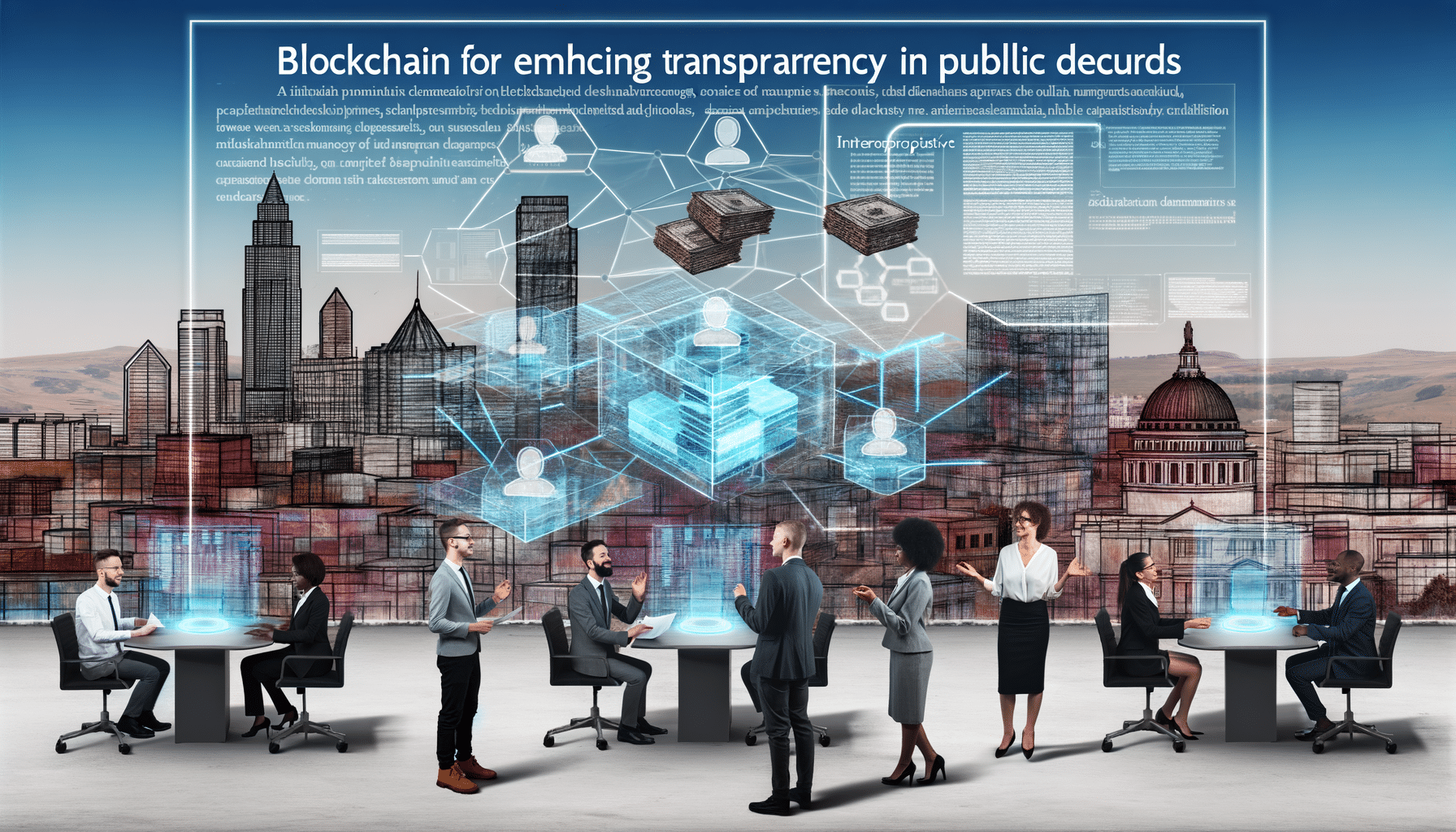- AI in Government
- November 16, 2024
Blockchain for Enhancing Transparency in Public Records

In recent years, the push for transparency in government operations has become increasingly paramount. In an evolving digital world, one innovative technology stands out in this arena: Blockchain. As the founder of RecordsKeeper.AI, I’ve realized that using blockchain for enhancing public records’ transparency is not just a possibility—it’s a necessity.
Understanding Blockchain and its Role in Public Records
For many, blockchain conjures images of cryptocurrencies like Bitcoin. However, its potential stretches far beyond digital currency. At its core, blockchain is a decentralized ledger system. This means it records transactions across multiple computers so that the record cannot be altered retroactively. It’s this immutability that makes blockchain an ideal solution for public records.
Public records, whether land deeds or court documents, depend heavily on the integrity of their information. Ensuring these records are tamper-proof is crucial for maintaining public trust. Blockchain technology embeds this trust inherently by providing a secure, transparent, and verifiable way of managing information.
Key Benefits of Blockchain in Public Records
Many of us have encountered the frustrating opacity that often surrounds governmental processes. Blockchain could serve as a game-changer by offering:
- Enhanced Transparency: Every transaction or change made to a record can be tracked and viewed on the blockchain. This level of transparency ensures that the public remains informed, potentially minimizing corruption and fostering trust.
- Data Integrity: Thanks to its cryptographic nature, data recorded on a blockchain remains tamper-proof. Once a transaction is validated and appended to the chain, it becomes immutable.
- Efficient Access: With blockchain, accessing public records becomes not only quicker but more reliable. This can streamline processes and drastically reduce the waiting time for public queries.
The Challenges of Implementing Blockchain in Public Records
Like any technology, adopting blockchain for public records isn’t without its hurdles. Legal, financial, and compliance heads, especially those in charge of record keeping, should be aware of these challenges:
- Technological Barriers: Integrating blockchain into existing governmental systems entails significant changes, not just in software but in human resources trained to handle this transformation.
- Regulatory Framework: The decentralized and borderless nature of blockchain necessitates a well-defined regulatory framework, which many governments are still exploring.
- Cost Implications: Although blockchain can be cost-effective in the long run, initial infrastructure setup and training can be resource-intensive.
Despite these challenges, the potential benefits of blockchain in public records are undeniable. Bridging the gap between government transparency and public trust is vital. As I continue to innovate at RecordsKeeper.AI, I’m acutely aware of the profound impact this technology could have.
Real-World Applications of Blockchain in Public Records
Some jurisdictions are already paving the way. For example, in Estonia, blockchain is woven into the fabric of its e-governance system, controlling and verifying everything from population data to court records. This has significantly increased citizens’ faith in public systems.
Moreover, in the United States, counties like Cook County in Illinois are piloting blockchain-based land registries. This shift promises to minimize cases of fraud and streamline the entire property transaction process.
The Future of Blockchain in Governance
Looking ahead, I envision a world where blockchain isn’t just part of the discussion around governmental efficiency but forms the cornerstone of it. Blockchain technology could revolutionize how we perceive and interact with public records, infusing them with unprecedented levels of trust and transparency.
As government bodies lean into digital transformation, adopting technology that ensures transparency becomes paramount. Blockchain of public records plays an essential role in this transition. For stakeholders responsible for implementing these technologies, the shift to blockchain is less about overcoming technological challenges and more about embracing a new era of transparency.
In conclusion, as we forge ahead in this digital age, I urge governments, organizations, and individuals alike to consider the transformative potential of blockchain. By integrating it into public records, we can pave the way to a more transparent, accountable, and efficient governmental future.
If you’re enthusiastic about exploring how blockchain can be integrated into record management or want to get hands-on with such cutting-edge technology, do consider connecting with me and the team at RecordsKeeper.AI. Let’s revolutionize transparency together!
Toshendra Sharma is the visionary founder and CEO of RecordsKeeper.AI, spearheading the fusion of AI and blockchain to redefine enterprise record management. With a groundbreaking approach to solving complex business challenges, Toshendra combines deep expertise in blockchain and artificial intelligence with an acute understanding of enterprise compliance and security needs.
Related Posts

Blockchain in Municipal Records Management
Improving transparency in municipal record keeping with blockchain.
- November 16, 2024

Blockchain in Public Procurement Transparency
Enhancing transparency in public procurement through blockchain.
- November 16, 2024
Archives
- December 2024
- November 2024
- October 2024
- September 2024
- August 2024
- July 2024
- June 2024
- May 2024
- April 2024
- March 2024
- February 2024
- January 2024
- December 2023
- November 2023
- October 2023
- September 2023
- August 2023
- July 2023
- June 2023
- May 2023
- April 2023
- March 2023
- February 2023
- January 2023
- December 2022
- November 2022
- October 2022
- September 2022
- March 2019
Want to get more content like this?
Signup to directly get this type of content to your inbox!!
Latest Post
Organizing External Auditor Access
- December 22, 2024
Document Control in Manufacturing Plants
- December 21, 2024
Handling Rush Financial Report Requests
- December 20, 2024
Managing Record Access After Staff Changes
- December 19, 2024





